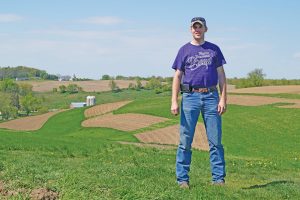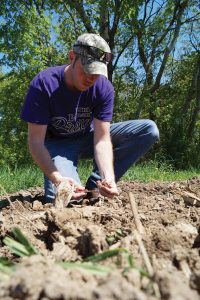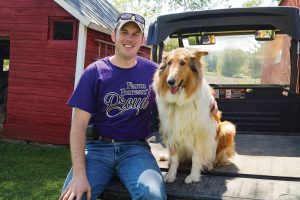 Growing Crops, Cultivating Leaders
Growing Crops, Cultivating Leaders
A farmer by night and on the weekends, Derek Husmoen’s day job also revolves around dirt.
It was a project on his family’s, then dairy, farm that first got him interested in soil.
The local Department of Land Management worked with the family to build a barnyard for their cows. What probably seemed like a simple project to them, was life-changing for Husmoen.
“I enjoyed seeing the project from start to finish and the consideration they had for the soil,” Husmoen said. “Prior to that our cows would sink but after completion, they had a nice foundation to stand on.”
Though the family’s cows were sold, the neighbor’s organic youngstock now reap the benefits as they now use the facility in the summertime.
While farming has always been Husmoen’s first love, his interest in soil and science blossomed with land judging through his high school’s FFA chapter and led him to major in ag engineering technology and minor in soil science at UW-River Falls.
After earning a bachelor’s degree, Husmoen decided to attend Texas A&M University when he learned about a graduate research assistantship from his adviser at UW-River Falls.
 “I have always loved science, and this gave me the opportunity to conduct soil and water quality research,” Husmoen explained.
“I have always loved science, and this gave me the opportunity to conduct soil and water quality research,” Husmoen explained.
After two years of research, his master’s degree in soil science was complete but another opportunity arose. This time to travel abroad.
“I spent June through August in Belgium working on a water quality research project,” Husmoen said. “I’ve always been interested in travel but never really had time.”
During the three months abroad, Husmoen traveled on his own and met graduate students from around the world in addition to working on a research project.
“One of the things I found interesting was there are farmers (in Belgium) who have to pay to export their manure,” Husmoen said. “That’s something you don’t see in the U.S.”
There was no doubt working with soil and doing nutrient management work was a career Husmoen wanted to pursue. After returning to the U.S., he started his first job in Kansas as a soil conservation technician for the USDA Natural Resources Conservation Service.
“I liked working there but, it just wasn’t home,” Husmoen said. “I like being in dairy country.”
After about three years in Kansas, he found a job closer to home. For the past three years, Husmoen has worked for the Winona County NRCS office in Minnesota as a soil conservationist.
“I work with farmers to keep soil in place and reduce water quality issues,” Husmoen explained. “We work together to solve any issues they might be having. They usually know what they need help with and we work with them to find a solution. We are helping farmers get conservation on the ground.”
Husmoen knows it’s not a common job to be a soil conservationist. When he shares what he does with someone not familiar with agriculture he usually gets a lot of questions.
“I think the average person just sees equipment and doesn’t really know there are so many practices to go along with it,” Husmoen said. “It’s not just planting a crop, there’s so much more involved.”
Husmoen said he enjoys working with newer farmers the most.
“We had one young farmer who came in and had soil erosion problems,” Husmoen shared. “We took a look at his fields last fall after harvest and found there were ditches, so we came up with a plan to build some waterways. Now, he has shown interest in cover crops so we are working with him on that.”
Husmoen said he enjoys working with young farmers because of their eagerness to learn.
Leading the Young Farmer and Agriculturist Committee
When Husmoen moved back to Wisconsin, Farm Bureau staff member Steve Boe, reached out to him and asked if he wanted to fill a vacant spot on the state Young Farmer and Agriculturist Committee.
Knowing a little about Farm Bureau and having a few other leadership roles from college under his belt, he stepped up to the challenge.
“I wasn’t completely new to Farm Bureau,” Husmoen explained. “My parents have been members for years and I worked in the shake stand at the county fair when I was younger. I think the biggest learning curve has been getting to know our area’s YFA members. Each area in the state is different when it comes to their YFA involvement. It’s getting to know the members and encouraging them to get involved.”
 Since becoming more involved in Farm Bureau, Husmoen has enhanced his communication skills, learned about policy development, met with lawmakers and participated in the one-year, Farm Bureau-focused leadership training course, the Leadership Institute.
Since becoming more involved in Farm Bureau, Husmoen has enhanced his communication skills, learned about policy development, met with lawmakers and participated in the one-year, Farm Bureau-focused leadership training course, the Leadership Institute.
Husmoen appreciates Farm Bureau’s diversity among its members.
“Farmers can get together and talk about their specific niche, but it’s nice in Farm Bureau because you have a variety of roles in agriculture and can learn from each other,” Husmoen explained. “It’s a broad agriculture organization and that allows you to learn a lot from others.”
This year as chair of the state YFA committee, Husmoen sits on the WFBF Board of Directors, which is made up of nine directors, one from each of Farm Bureau’s nine districts, and a representative from the state Promotion and Education and YFA committees.
“At first it was almost intimating because there are a lot of years of experience in that board room,” Husmoen said. “Being a part of the Board is a great privilege and seeing the positive direction the organization is moving is exciting.”
Husmoen said support for the YFA program across the organization is why the program has grown in recent years.
“We want to make the YFA program the best it can be,” Husmoen said. “We want to keep making positive strides. Without support from the Board and other leaders we wouldn’t be able to grow the program.”
Story by Amy Eckelberg. Original version appeared in the June/July 2017 issue of Wisconsin Farm Bureau Federation’s Rural Route.

